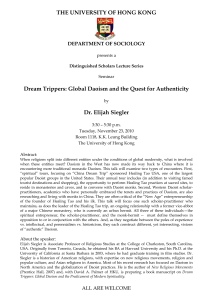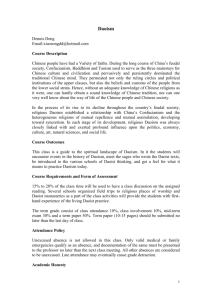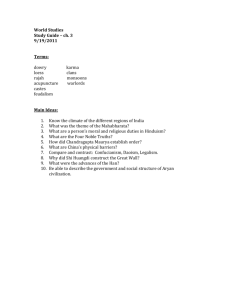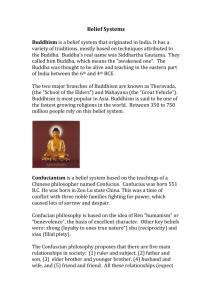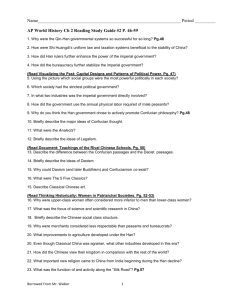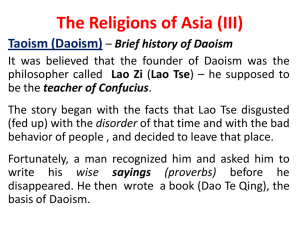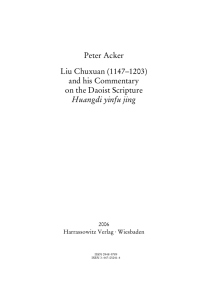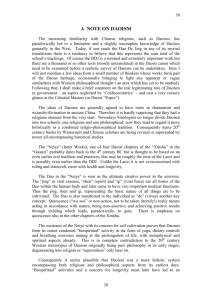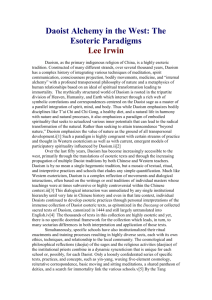Daoism and Chinese Society
advertisement
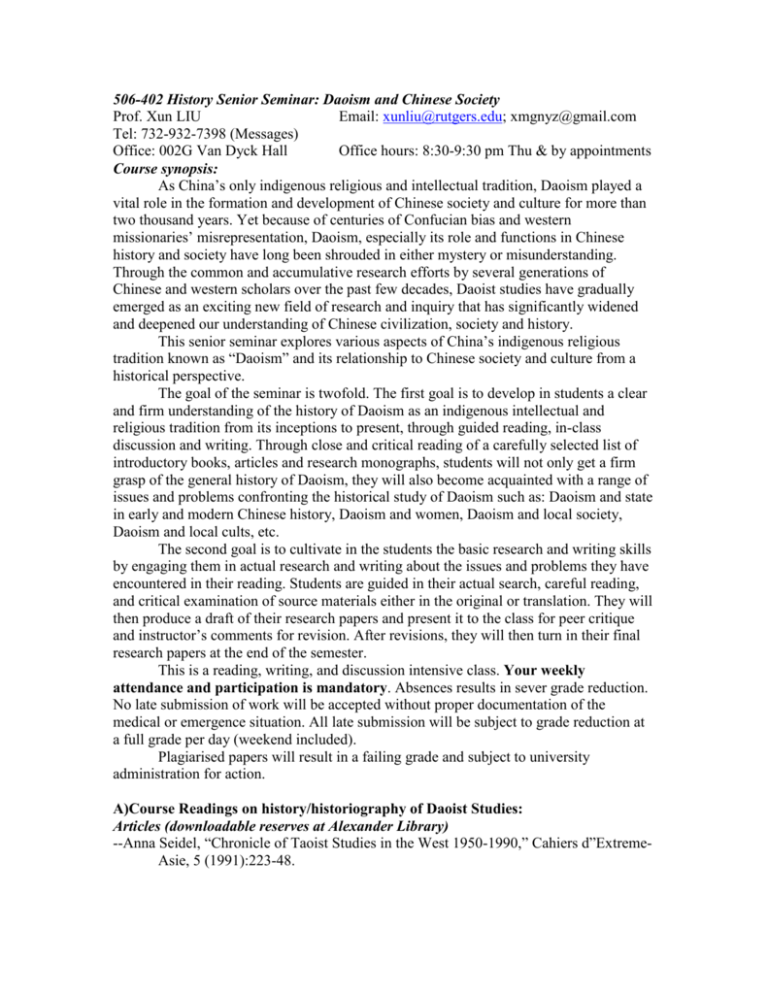
506-402 History Senior Seminar: Daoism and Chinese Society Prof. Xun LIU Email: xunliu@rutgers.edu; xmgnyz@gmail.com Tel: 732-932-7398 (Messages) Office: 002G Van Dyck Hall Office hours: 8:30-9:30 pm Thu & by appointments Course synopsis: As China’s only indigenous religious and intellectual tradition, Daoism played a vital role in the formation and development of Chinese society and culture for more than two thousand years. Yet because of centuries of Confucian bias and western missionaries’ misrepresentation, Daoism, especially its role and functions in Chinese history and society have long been shrouded in either mystery or misunderstanding. Through the common and accumulative research efforts by several generations of Chinese and western scholars over the past few decades, Daoist studies have gradually emerged as an exciting new field of research and inquiry that has significantly widened and deepened our understanding of Chinese civilization, society and history. This senior seminar explores various aspects of China’s indigenous religious tradition known as “Daoism” and its relationship to Chinese society and culture from a historical perspective. The goal of the seminar is twofold. The first goal is to develop in students a clear and firm understanding of the history of Daoism as an indigenous intellectual and religious tradition from its inceptions to present, through guided reading, in-class discussion and writing. Through close and critical reading of a carefully selected list of introductory books, articles and research monographs, students will not only get a firm grasp of the general history of Daoism, they will also become acquainted with a range of issues and problems confronting the historical study of Daoism such as: Daoism and state in early and modern Chinese history, Daoism and women, Daoism and local society, Daoism and local cults, etc. The second goal is to cultivate in the students the basic research and writing skills by engaging them in actual research and writing about the issues and problems they have encountered in their reading. Students are guided in their actual search, careful reading, and critical examination of source materials either in the original or translation. They will then produce a draft of their research papers and present it to the class for peer critique and instructor’s comments for revision. After revisions, they will then turn in their final research papers at the end of the semester. This is a reading, writing, and discussion intensive class. Your weekly attendance and participation is mandatory. Absences results in sever grade reduction. No late submission of work will be accepted without proper documentation of the medical or emergence situation. All late submission will be subject to grade reduction at a full grade per day (weekend included). Plagiarised papers will result in a failing grade and subject to university administration for action. A)Course Readings on history/historiography of Daoist Studies: Articles (downloadable reserves at Alexander Library) --Anna Seidel, “Chronicle of Taoist Studies in the West 1950-1990,” Cahiers d”ExtremeAsie, 5 (1991):223-48. --Russell Kirkland, “The Historical Contours of Taoism in China: Thoughts on Issues of Classification and Terminology,” JCR 25 (1997):57-76. --Fanciscus Verellen, “Daoism: The State of the Field” JAS 1 (Marh 1996) --Vincent Goossaert, “1898: The Beginning of the End of Chinese Religion?” JAS, 65.2 (May 2006):307-336 (To be sent to you via email) Books (Available at RU Bookstore): ---Kristofer Schipper, The Taoist Body, Stanford, 2000. ---Livia Kohn, Daoism and Chinese Culture, Three Pines Press,, 2003 Daoism and Women, Three Pine Press,2004 B) Reference books (on reserve): ---Schipper and Verellen, The Taoist Canon: A Historical Companion to the Daozang, -Chicago, 2005. ---Livia Kohn, ed., Daoism Handbook, Brill, 2000 ---Fabrizio Pregadio, The Encyclopedia of Daoism, 2005. ---John Lagerwey, Religion and Chinese Society, vols I&II, 2004. C) Samples of Primary Sources in Translation (Libraries): Victor Mair, Daodejing: The Way of Virtue and Power Chan Wenjit: Sources in Chinese Tradition Steven Bokenkamp, The Early Daoist Literature, Berkeley, 1999. Livia Kohn, Daoist Monastic Manual: A Translation of Fengdao kejie, Oxford, 2004 Taoist Experience: An Anthology, SUNY Press, 1993 Taoist Techniques of Longevity and Health, Michigan, 1970s Eva Wong, Seven Taoist Masters, Boston: Shambala, 1990. Suzzane Cahill, Divine traces of the Daoist sisterhood : “Records of the Assembled Transcendents of the Fortified Walled City,” Boston: Three Pine Press, 2005. D) Grading: Timely completed assignments: (Book report/bibliographic review/paper proposal) Participation in classroom discussion: (Discussion/peer review/presentation) Final paper (first draft, and final version) 25% 15% 60% E) Weekly Schedule: Week 1 1/16: Introduction to the Daoist Studies Week 2 1/23: Readings/Historiographic issues of Daoist Studies A. Seidel/R. Kirkland/F. Verellen Week 3 1/30: Readings/Book reports/Research paper topic proposals due (1) K. Schipper /L. Kohn Week 4 2/6: Reading reports and Bibliographic research/methodology This session is to be conducted at the Alexander Library How to search for reference material on-line Library and online resources on Daoism and society Week 5 2/13: Bibliographic Research/Methodology Progress reports on bibliographic research/writing plan progress Library research and consultations Writing plans reports Week 6 2/20 Presentation of Research Writing plans/Bibliographic essay due (2) Discussion and presentation of writing plans/bibliographic research Week 7 2/27 Individual conference: progress reports and guidance Week 8 3/6 Individual conference: progress reports and guidance Spring Recess: 3/10-18 Week 9 3/20 First drafts due/Peer review and comments (3) Presentation of draft papers and peer comments/feedback Week 10 3/27 Feedback and suggestions on the writings Sessions devoted to discussion of research/writing problems Week 11 4/3 Individual conference: Week 12 4/10 Individual conference Week 13 4/17 Presentation and comments Formal presentation of papers: 15-20 min each and peer review Week 14 4/24 Presentation and comments: Formal presentation of papers: 15-20 min each and peer review Week 15 5/1 Final version due (4) Week 16 5/8 Individual reviews
